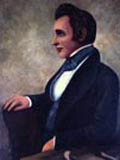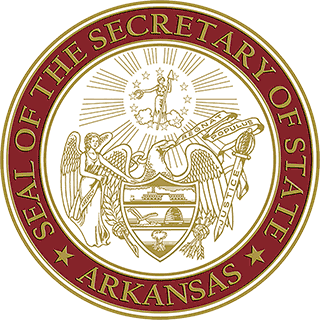Territorial Governors 1819-1836
Territorial Governors 1819-1836
James Miller
 Born: April 25, 1776, at Peterborough, New Hampshire
Born: April 25, 1776, at Peterborough, New Hampshire
Died: July 7, 1851, at Temple, New Hampshire
Buried: Temple, New Hampshire (pres.)
Served: 1819-1825
James Miller, Arkansas's first territorial governor, was educated for the law but in 1808 entered the United States army as major and was made lieutenant-colonel in 1810. He distinguished himself during the War of 1812 at the battle of Lundy's Lane; for this service he was brevetted brigadier-general, and received a gold medal from Congress. He was appointed governor of Arkansas in 1819 and held that post until 1825. Miller was slow to arrive in Arkansas after his appointment and spent much time out of the territory, but during his administration the foundations of the territorial government were laid: courts and jails were established, property tax assessment procedures put in place and voting by voice rather than by ballot established for general elections. During the Miller administration the territorial capitol was removed from Arkansas Post to Little Rock. Ill health and, probably, a disinclination toward frontier life led Miller to resign the governorship but he subsequently regained his health and served as customs collector of the port of Salem, Massachusetts, from 1825 until 1849.
George Izard
 Born: October 21, 1776, at London, England
Born: October 21, 1776, at London, England
Died: October 22, 1828, at Little Rock, Arkansas
Buried: Mount Holly Cemetery, Little Rock (reinterred 1843; original grave site unknown)
Served: 1825-1829
George Izard, Arkansas' second territorial governor, emigrated with his family to the United States at the age of sixteen. Trained first as a lawyer, then as a military engineer, Izard served with competence during the War of 1812; one historian notes that Izard "was the only officer of the war of 1812 who had been completely educated in the schools." General Izard resigned from the army in January 1815, lived with his family in Philadelphia and was appointed governor of Arkansas in 1825. His service as governor was uneventful; the territory's militia was organized and the Choctaw and Quapaw nations relocated to the Indian Territory but little else distinguished the Izard administrations. Izard made few friends in Arkansas, preferring to spend his time with his extensive library and his collection of razors. Izard died during his second term from complications following an attack of gout.
John Pope
 Born: 1770, in Prince William County, Virginia
Born: 1770, in Prince William County, Virginia
Died: July 12, 1845, at Springfield, Kentucky
Buried: Springfield (Kentucky) Cemetery
Served: 1829-1835
John Pope was brought to Kentucky in boyhood. He lost one arm through a farm accident, thus forcing a change of life plans. Pope settled on the study of law and was admitted to the Kentucky bar in 1794. He was for several years a member of the Kentucky state house of representatives and in 1807 was elected to the United States Senate as a Democrat, serving from 1807 until 1813. During the 1820s he remained active in politics, notably as a friend and supporter of Andrew Jackson. In 1829 Pope received the governorship of Arkansas from the Jackson administration. During his service, Pope advocated "internal improvements"–that is, road-building–and attracted notice for his veto in 1831 of a bill which would have transferred land granted the territory for the construction of a territorial courthouse or capitol, to territorial secretary Robert Crittenden in exchange for Crittenden's already-built mansion house. Pope insisted that the seat of government be located in the heart of Little Rock's business district, on a bluff overlooking the Arkansas River. After his term, Pope returned to Kentucky where he practiced law until he was again elected to Congress, and twice re-elected, serving from 1837 until 1843.
William Savin Fulton
 Born: June 2, 1795, in Cecil County, Maryland
Born: June 2, 1795, in Cecil County, Maryland
Died: August 15, 1844, at "Rosewood", near Little Rock, Arkansas
Buried: Mount Holly Cemetery, Little Rock
Served: 1835-1836
William Savin Fulton studied law and served during the War of 1812 as an aide on the staff of Colonel Armistead, commander of Fort McHenry. After the war, he returned briefly to the law before becoming private secretary to General Andrew Jackson during his campaign against the Seminoles of Florida. At its close he settled in Alabama for the practice of the law. In 1829 President Jackson appointed Fulton secretary of the territory of Arkansas, and in 1835 its governor, which office he held until the territory became a state. During Fulton's brief governorship he courted controversy by opposing the drafting of a proposed state constitution without prior approval by Congress. Over his objections the document was drafted, adopted by the constitutional convention, then submitted to Congress; it was approved, after hot debate. Fulton was then chosen as one of Arkansas's first U. S. senators, serving from December 1836 until his death.



